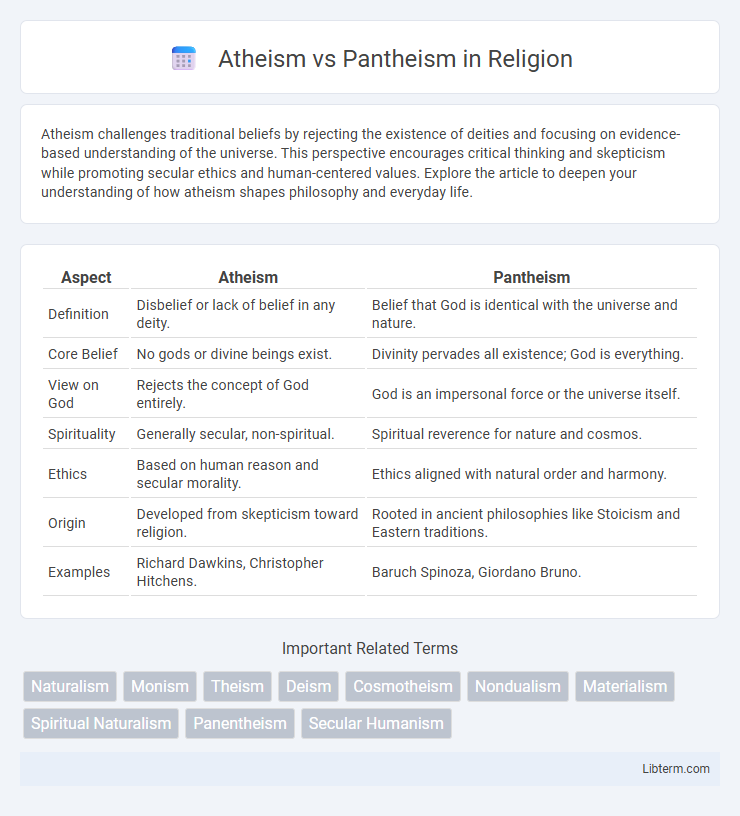Atheism challenges traditional beliefs by rejecting the existence of deities and focusing on evidence-based understanding of the universe. This perspective encourages critical thinking and skepticism while promoting secular ethics and human-centered values. Explore the article to deepen your understanding of how atheism shapes philosophy and everyday life.
Table of Comparison
| Aspect | Atheism | Pantheism |
|---|---|---|
| Definition | Disbelief or lack of belief in any deity. | Belief that God is identical with the universe and nature. |
| Core Belief | No gods or divine beings exist. | Divinity pervades all existence; God is everything. |
| View on God | Rejects the concept of God entirely. | God is an impersonal force or the universe itself. |
| Spirituality | Generally secular, non-spiritual. | Spiritual reverence for nature and cosmos. |
| Ethics | Based on human reason and secular morality. | Ethics aligned with natural order and harmony. |
| Origin | Developed from skepticism toward religion. | Rooted in ancient philosophies like Stoicism and Eastern traditions. |
| Examples | Richard Dawkins, Christopher Hitchens. | Baruch Spinoza, Giordano Bruno. |
Introduction to Atheism and Pantheism
Atheism denies the existence of deities or supernatural beings, emphasizing a worldview based on empirical evidence and scientific reasoning. Pantheism identifies God with the universe itself, suggesting that divinity is immanent in all aspects of nature and reality. Both perspectives offer distinct interpretations of spirituality, metaphysics, and the origins of existence.
Defining Atheism: Core Beliefs
Atheism is defined by the absence of belief in deities or gods, emphasizing a reliance on empirical evidence and scientific understanding to explain natural phenomena. Core beliefs of atheism reject supernatural claims and divine interventions, promoting secular ethics grounded in reason and human experience. This worldview prioritizes critical thinking and skepticism over faith-based doctrines.
Understanding Pantheism: Key Concepts
Pantheism identifies the divine with the universe, asserting that everything collectively forms an all-encompassing, immanent God. This worldview emphasizes the interconnectedness of all natural elements, rejecting the notion of a personal, transcendent deity as found in traditional theism. Unlike atheism, which denies any divine existence, pantheism celebrates spirituality through the reverence of nature and the cosmos.
Philosophical Origins of Atheism
Atheism originates from ancient Greek philosophy, with thinkers like Democritus and Epicurus challenging traditional theistic views by emphasizing empirical observation and natural explanations for existence. The rise of scientific inquiry during the Enlightenment further solidified atheism's foundation by promoting rationalism and skepticism toward supernatural claims. Philosophically, atheism pivots on the rejection of deity existence, contrasting with pantheism's view of divinity as synonymous with the universe itself.
Historical Roots of Pantheism
Pantheism traces its historical roots to ancient philosophical traditions, prominently within Stoicism, where the universe was perceived as a singular, divine entity. Influential thinkers such as Baruch Spinoza further developed pantheistic ideas in the 17th century, equating God with the totality of existence. This perspective contrasts with atheism, which denies the existence of deities altogether, emphasizing empirical and scientific explanations for the cosmos.
Approaches to the Divine: None vs. All
Atheism rejects the existence of any divine entity, emphasizing a secular understanding of the universe without supernatural involvement. Pantheism embraces the divine as synonymous with the entirety of existence, viewing God as the sum of all natural phenomena and the universe itself. This fundamental difference shapes atheism's focus on empirical evidence and pantheism's spiritual reverence for the cosmos.
Ethics and Morality in Atheism and Pantheism
Atheism approaches ethics and morality through secular frameworks such as humanism and consequentialism, emphasizing reason, empathy, and societal well-being without relying on divine authority. Pantheism, viewing the universe and nature as divine, grounds morality in harmony with the natural world and the interconnectedness of all existence, promoting principles of balance and respect for life. Both systems derive ethical guidance independently from traditional religious dogma, fostering moral behavior based on either human-centered rationale or a cosmic unity perspective.
Science, Nature, and Spirituality
Atheism generally rejects supernatural beliefs, emphasizing empirical evidence and scientific rationalism as the basis for understanding the universe. Pantheism identifies the divine with the cosmos, embracing nature as a manifestation of spirituality and interconnectedness, often aligning with ecological and holistic perspectives. Both viewpoints inspire deep reflections on the role of science in explaining natural phenomena while offering contrasting frameworks for interpreting spirituality and the essence of existence.
Social Perceptions and Popularity
Atheism is often perceived as a secular or scientific worldview, gaining popularity among younger generations and in more urbanized regions, with global surveys indicating a rise in non-religious identification. Pantheism, which equates God with the universe, tends to attract those interested in spirituality without organized religion, maintaining a niche but steady following often associated with environmental and holistic movements. Social acceptance of atheism varies widely by culture, with higher tolerance in Western societies, while pantheism is less understood but viewed positively within New Age communities.
Conclusion: Comparative Perspectives
Atheism rejects belief in deities, emphasizing empirical evidence and skepticism, while pantheism identifies divinity with the universe itself, fostering a spiritual connection to nature. Both perspectives challenge traditional theistic views but differ fundamentally in their ontological claims about existence and divinity. Understanding these distinctions aids in appreciating diverse philosophical approaches to meaning, spirituality, and the nature of reality.
Atheism Infographic

 libterm.com
libterm.com